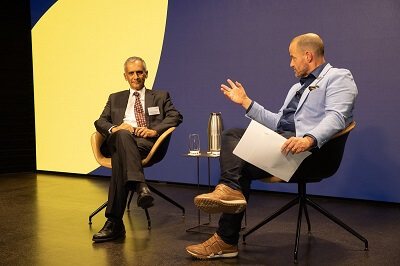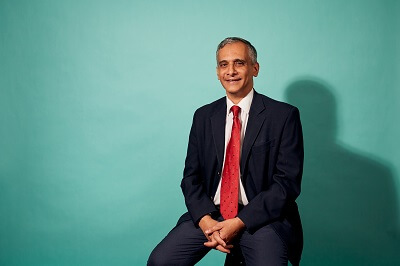
In 2022, liver cancer outcomes are where breast cancer outcomes were about 35 years ago: On average, only 15% of liver cancer patients survive beyond five years.
Today, the five-year survival rate for breast cancer has climbed to 90%, thanks to advances in screening and treatments. This is what Professor Jacob George wants for liver cancer.
Read on to learn more about Professor George's vision for liver cancer research, the progress we've made and what we need to do to reduce its impact on society.
You can also watch footage of Professor George speaking about the topic at our Research Awards night below.
Professor Jacob George on the links between hepatitis, lifestyle factors, and liver cancer:
If we put it in very simple terms, hepatitis - whether it's hepatitis B or C - causes inflammation of the liver. This inflammation ultimately changes the genetic makeup of the cells, which activates genes that cause uncontrolled cell proliferation. So, the cells multiply and, before you know it, it's cancer.
Excessive drinking and leading an unhealthy lifestyle can also contribute to chronic inflammation of the liver and result in liver cancer.
On the progress made to reduce the impact of hepatitis in Australia:
We've made tremendous progress in reducing the impact of hepatitis in Australia.
We now have a simple blood test that can identify if people have hepatitis B or C.
For hepatitis B, we've got very effective treatments that can suppress the virus and reduce the risk of liver cancer by 70%.
With hepatitis C, we've now got drugs that can cure it. Older treatments for hepatitis C used to be quite brutal, but this is no longer the case and it's been a total game changer. Nowadays, it's just a tablet a day. You take it for eight or twelve weeks, there are no side effects and there's a 98% cure rate.
We're actually on track to become the first country in the world to eliminate hepatitis C by 2028. This would get rid of up to about a third of cases of liver cancer. That's the transformational impact of research.
On the stigma of a hepatitis diagnosis:
There's always been a lot of stigma associated with liver disease. Hepatitis is often tied to things like alcohol consumption, lack of exercise, unhealthy eating habits, sexual transmission when it comes to hepatitis B or blood to blood transmission when it comes to hepatitis C.
None of our patients actually like to talk about it.
But that's the beauty of these new treatments. In the old days, we had to ask patients about risk factors because the treatment was so brutal. Today, we don't care. You're positive? We'll treat you. It's that easy.
We treat patients who've had significant alcohol issues who have hepatitis C. They come to us after their treatment and say, "I've always been told that I'm an alcoholic. You guys are the first people to just treat me as a person, like I've got a life, I've got a family".
On being a practicing physician as well as a researcher:
I'm very, very privileged that I actually treat patients. For me, every bit of my research is informed by my patients.
Yesterday I had a patient with a 12cm liver cancer first presentation. Your heart moves out and you say, "I want to help them".
And the only way you can actually help them is understanding the disease. If you can understand it, that gives you a chance to develop targeted therapies to treat it.
On the importance of consumer involvement in research funding:
20 years ago or even 10 years ago, research funding was done very differently. Scientists would simply develop their own agenda and ask for funding.
What's changed is that consumers now have a say. Funding organisations like Cancer Council, now work with consumers - patients, survivors and their carers, family and close friends - to make sure funding goes towards research that will make a difference in the real world.
I think it's so important to involve consumers in setting the agenda. We must always remember that we must be researching what matters to people.

Professor Jacob George is the Director of the Storr Liver Centre at The Westmead Institute for Medical Research. He researches all things liver - looking at diseases that affect and damage the liver, including liver cancer.
Most recently, Professor George has been extensively involved in translational research to improve the outcomes of patients with advanced primary liver cancer.
Learn more about Professor George's research funded by Cancer Council.
Click through to learn more about secondary liver cancer.






